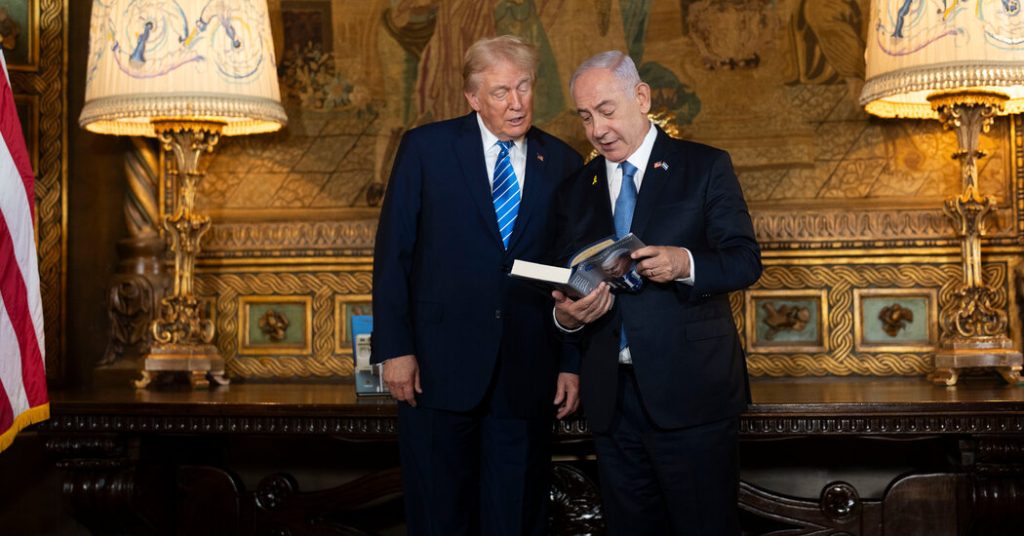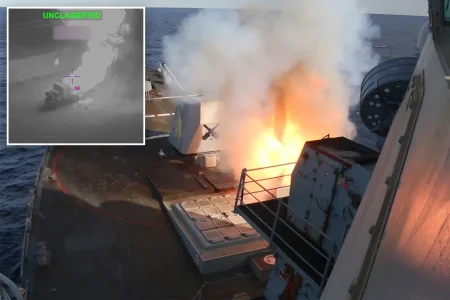The first face-to-face meeting between President Trump and a world leader since his return to office features Israeli Prime Minister Benjamin Netanyahu. This meeting, taking place just two weeks after Trump’s inauguration, underscores the renewed focus on the complex dynamics of the Middle East. Several critical issues are on the agenda, including the precarious ceasefire between Israel and Hamas, Iran’s nuclear ambitions, potential arms deals, and the pursuit of normalized relations between Israel and Saudi Arabia. This meeting follows a period of strained relations between Netanyahu and the previous Biden administration, offering an opportunity to reset the U.S.-Israel partnership under the Trump presidency.
The Trump-Netanyahu meeting carries significant weight, particularly given the recent conflict between Israel and Hamas, which has left a trail of devastation in Gaza and heightened tensions in the region. The two leaders, having shared a close relationship during Trump’s first term, are expected to delve into the intricate details of the phased ceasefire agreement with Hamas. Crucially, the discussion will focus on the return of hostages held by Hamas and the potential for a broader agreement involving Saudi Arabia, a key player in regional stability. The success of this diplomatic effort hinges on achieving a lasting peace in Gaza, a goal complicated by the volatile political landscape in both Israel and the Palestinian territories.
Despite the appearance of renewed camaraderie, underlying tensions between Trump and Netanyahu are anticipated. The two leaders differ on their approach to Iran’s nuclear program and the timeline for resolving the Gaza conflict. Trump has expressed a desire for a swift resolution and the immediate return of all hostages, while Netanyahu, facing political pressures at home, may prefer a more gradual approach. This difference in strategy could create friction during the talks, with Trump holding a stronger hand due to the United States’ leverage in the region. The International Criminal Court’s issuance of an arrest warrant for Netanyahu, accusing him of war crimes related to the Gaza conflict, further complicates the situation, adding another layer of pressure on the Israeli prime minister.
The negotiations surrounding the Gaza ceasefire have progressed beyond the initial phase, which involved a prisoner exchange and the withdrawal of Israeli troops from populated areas. Trump, although not directly involved in the initial agreement negotiated during the Biden administration, has claimed credit for the deal. The crucial next phase, aimed at solidifying a permanent ceasefire, will now fall under his purview. Netanyahu’s pre-meeting with Trump’s Middle East envoy, Steve Witkoff, and the subsequent announcement of an Israeli delegation to Qatar for further discussions signal a commitment to moving the process forward. However, the complexities of the situation and the divergent interests of the involved parties suggest a challenging path ahead.
Adding to the regional complexities is the reported assessment by U.S. intelligence that Iran is pursuing a more readily achievable nuclear weapon, potentially capable of rapid development. While the Iranian leadership’s intentions remain unclear, the new president has expressed interest in engaging with the Trump administration, even as Iran’s nuclear scientists continue their work. This development presents a significant challenge for both Trump and Netanyahu, who consider a nuclear-armed Iran an existential threat to Israel and a destabilizing force in the region. The two leaders are expected to explore options for preventing Iran from acquiring nuclear weapons, including the possibility of military action, a course of action Netanyahu has previously advocated but which has faced resistance from the United States.
Beyond the immediate crisis in Gaza and the looming threat of a nuclear Iran, the meeting will also address the potential for normalizing relations between Israel and Saudi Arabia. This long-sought-after diplomatic breakthrough, previously championed by both Trump and Biden, faces renewed challenges following the recent conflict in Gaza. Saudi Arabia’s apparent shift in position, conditioning normalization on the establishment of a Palestinian state, presents a potential obstacle to these efforts. Despite these challenges, the pursuit of normalization remains a significant objective, with the potential to reshape the political landscape of the Middle East. Coupled with this diplomatic push is Netanyahu’s request for the expedited delivery of over $8 billion worth of arms from the United States, a request currently under congressional review. The Trump administration’s decision to proceed with the transfer of previously paused shipments of large bombs signals a potential shift in U.S. policy towards arms sales to Israel in the wake of the Gaza conflict.











